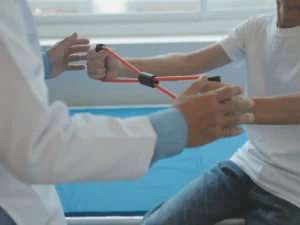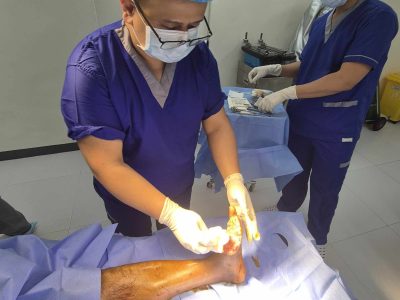Wounds are more than just physical injuries—they affect the whole person, impacting their quality of life and emotional well-being. Medical wound care is an essential aspect of healthcare that involves much more than simply dressing a wound. It combines advanced medical treatments, patient education, and compassionate care to promote healing, prevent complications, and restore dignity.
Whether dealing with minor cuts, chronic ulcers, or complex surgical wounds, effective wound care can dramatically improve outcomes. This article explores the importance of medical wound care, the latest treatment innovations, and the holistic, patient-centered approaches that make a real difference—especially in underserved communities.
Understanding Medical Wound Care
Medical wound care refers to the comprehensive management and treatment of wounds caused by injury, surgery, or underlying medical conditions. Wounds are generally classified as either acute or chronic. Acute wounds, such as cuts, abrasions, or surgical incisions, typically heal within a predictable timeframe. Chronic wounds, including diabetic foot ulcers or pressure sores, can linger for months or even years without proper care, leading to serious health complications.
Risk factors such as diabetes, poor circulation, infections, and repeated trauma increase the likelihood of wounds becoming chronic. Untreated or inadequately managed wounds can cause infections, pain, reduced mobility, and emotional distress, making timely and proper medical wound care crucial.
The Role of Advanced Medical Treatments in Wound Care
Modern medical wound care employs a variety of advanced treatments designed to accelerate healing and reduce complications. Technologies such as hydrocolloid dressings, negative pressure wound therapy (NPWT), and bioengineered skin substitutes have transformed wound management.
These evidence-based treatments not only protect wounds from infection but also create an optimal environment for tissue regeneration. Incorporating these innovations into patient care ensures better outcomes, shorter healing times, and reduced risk of hospitalizations.
Ethical practices and clinical expertise play an important role in selecting the right treatment tailored to each patient’s unique needs. Medical wound care is not one-size-fits-all but a carefully personalized approach that addresses the underlying causes and individual healing capabilities.
The Holistic Approach: Caring for the Person, Not Just the Wound
Effective medical wound care extends beyond physical treatment. A holistic approach considers the emotional, psychological, and social aspects of healing. Patients recovering from wounds often face stress, anxiety, or loss of independence, which can affect their recovery.
Integrating emotional support, patient education, and preventive strategies empowers patients to participate actively in their healing process. This comprehensive care model improves adherence to treatment plans and fosters a sense of dignity and hope.
Medical wound care providers who adopt this patient-centered approach understand that healing a wound also means nurturing the person behind it, ensuring their quality of life improves alongside their physical health.
Filipino Values in Wound Care: Kalinga (Care) and Lingap (Nurture)
In the Philippines, medical wound care is enriched by cultural values such as kalinga (care) and lingap (nurture). These principles emphasize compassionate, family-oriented, and community-centered care.
Clinics like Kalingap Wound Care Clinic embody these Filipino values by treating patients not just as medical cases but as family members deserving of kindness and respect. This approach strengthens trust between patients and healthcare providers and creates a supportive environment conducive to healing.
Community involvement and family support are integral to this philosophy, reminding us that wound care is a collective journey, not an isolated medical task.
Overcoming Barriers to Accessing Quality Wound Care
Access to quality medical wound care remains a challenge, especially for underserved communities. Financial constraints, lack of awareness, and limited healthcare infrastructure can prevent individuals from receiving timely treatment.
Addressing these barriers requires innovative solutions such as outreach programs, community partnerships, and affordability strategies. Many wound care providers collaborate with local organizations to bring care closer to those who need it most.
Raising awareness about wound prevention and early treatment also helps reduce the burden of chronic wounds, allowing more people to maintain healthy, active lives.
Empowering Patients Through Education and Support
Education is a cornerstone of effective medical wound care. Teaching patients how to care for their wounds at home, recognize signs of infection, and follow lifestyle changes is essential to successful healing.
Patients who understand their condition and treatment are more likely to comply with medical advice and avoid complications. Healthcare providers also offer emotional support to help patients navigate the often stressful healing journey.
Preventive care, such as proper hygiene, nutrition, and managing underlying conditions like diabetes, further empowers patients to reduce the risk of future wounds.
Why Choose a Trusted Wound Care Clinic?
Selecting the right medical wound care provider can significantly influence healing outcomes. Trusted clinics offer specialized expertise, advanced treatments, and a patient-focused approach that ensures comprehensive care.
Facilities like Kalingap Wound Care Clinic in Quezon City are recognized for their commitment to ethical, evidence-based practices combined with a compassionate Filipino approach. Being a recommended referral center means patients can expect consistent quality, accessibility, and professional support throughout their recovery.
When searching for wound care services, consider clinics that prioritize holistic care, community involvement, and patient empowerment.
Takeaway
Medical wound care is a vital component of healthcare that goes far beyond treating wounds superficially. It requires a blend of advanced medical technologies, compassionate patient-centered care, and a deep understanding of the individual’s needs. By embracing a holistic approach rooted in cultural values like kalinga and lingap, healthcare providers can foster healing that restores dignity and improves quality of life.
Access to quality wound care should never be limited by financial or social barriers. Through education, community outreach, and trusted partnerships, medical wound care can reach those who need it most, ensuring every wound has the best chance to heal fully.
If you or a loved one has a wound that isn’t healing or causing discomfort, don’t wait. Seek out a trusted medical wound care specialist who can guide you through a nurturing, effective healing journey.











